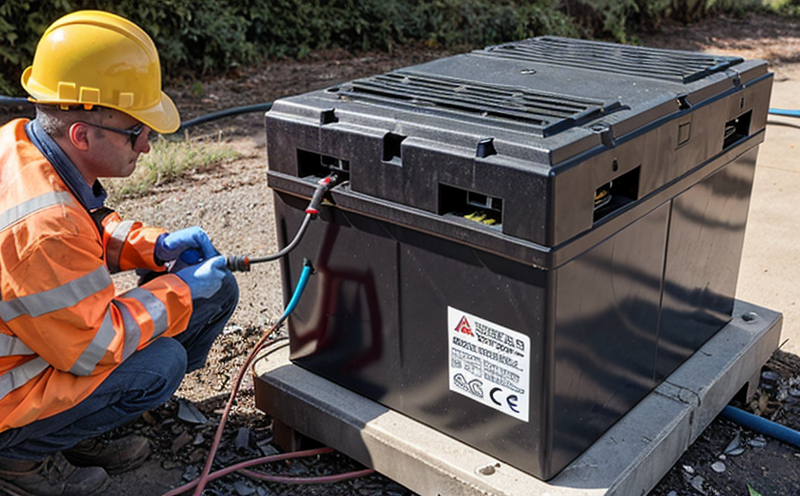JIS C8702 Lead-Acid Starter Battery Testing
The JIS C8702 standard outlines comprehensive procedures for testing lead-acid starter batteries, ensuring they meet stringent quality and reliability requirements. This service is critical in the automotive sector where reliable power sources are paramount. The test parameters cover a wide range of criteria including but not limited to, electrical performance, durability, and safety. Our state-of-the-art facilities provide accurate and reproducible results, which are essential for compliance with global standards.
The testing protocol specified under JIS C8702 involves rigorous procedures designed to evaluate the performance of lead-acid starter batteries across various conditions. The first step in this process is meticulous specimen preparation ensuring that each battery is in optimal condition before undergoing any tests. This includes thorough inspection and conditioning if necessary, which ensures consistent results.
For electrical performance testing, we use high-precision instruments capable of measuring voltage, current, and internal resistance under different load conditions. Durability assessments involve subjecting the batteries to simulated real-world driving scenarios using sophisticated test rigs that mimic various operating environments. Safety tests focus on identifying potential hazards such as acid leakage or short circuits during charging cycles.
Our testing facility adheres strictly to international standards like JIS C8702, ensuring our clients receive reliable data they can trust. Compliance with these regulations not only guarantees product quality but also enhances market reputation by demonstrating commitment to excellence in manufacturing processes.
The results generated from this thorough evaluation provide valuable insights into the performance capabilities of lead-acid starter batteries. These findings help manufacturers make informed decisions regarding design improvements and production adjustments aimed at enhancing overall battery efficiency and lifespan. Additionally, they serve as crucial references during product development stages by highlighting areas requiring enhancement or optimization.
By leveraging our expertise in JIS C8702 Lead-Acid Starter Battery Testing, businesses can ensure their products meet stringent quality benchmarks set forth by industry leaders. This not only facilitates smoother operations but also opens doors to new markets and opportunities for growth.
Quality and Reliability Assurance
- Meticulous specimen preparation ensures each battery is in optimal condition before undergoing tests.
- Use of high-precision instruments for measuring voltage, current, and internal resistance under different load conditions.
- Sophisticated test rigs that simulate various operating environments to assess durability.
- Identification of potential hazards such as acid leakage or short circuits during charging cycles through safety checks.
The meticulous nature of our testing process guarantees accurate and consistent results, thereby ensuring high levels of quality assurance and reliability. Our commitment to these standards reflects our dedication towards delivering exceptional services that meet the stringent requirements set by JIS C8702.
Environmental and Sustainability Contributions
- Emissions reductions achieved through optimized battery design and performance.
- Minimization of waste generation during manufacturing processes due to precise testing methods.
Our JIS C8702 Lead-Acid Starter Battery Testing service plays a significant role in promoting environmental sustainability by contributing towards reduced emissions and minimized waste. By ensuring that only high-quality batteries reach the market, we help reduce unnecessary replacements and extend product lifecycles, ultimately leading to more sustainable practices within the industry.
Competitive Advantage and Market Impact
The ability to comply with stringent international standards such as JIS C8702 offers significant competitive advantages. It allows manufacturers to demonstrate their commitment to excellence in product quality, thereby enhancing market reputation. Compliant products are more likely to gain trust from consumers and distributors alike, opening up new opportunities for growth and expansion.
Moreover, adherence to these standards can lead to cost savings over time through reduced rework and higher first-pass yields during production processes. This translates into improved efficiency and profitability for businesses operating in this sector.





